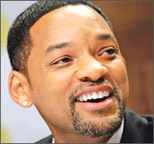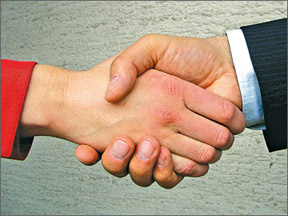Opportunities in disguise
Aditha DISSANAYAKE

|

Successful
candidate: Will Smith in
Pursuit of Happyness |
Remember the job interview Chris Gardner (played by Will Smith) faces
in the movie “Pursuit of Happyness?” (happiness is spelt with a y in the
title). The night before the interview Chris is painting his apartment
when the police comes to arrest him for not paying his parking tickets.
He spends the night in jail and the next morning makes it in the nick of
time to the interview but still dressed in the shabby shirt he was
wearing the night before.
The board of interviewers are surprised to see a candidate dressed
virtually in rags, inside their smart office but gives Chris a fair
hearing. At the end of the interview one interviewer asks “Chris, What
would you say if a guy walked in for an interview without a shirt on,
and I hired him? Chris thinks for the briefest of seconds and answers
“he must have had on some really nice pants”. He gets the job.
Then there is the joke about the businessman who is interviewing
applicants for the post of sales manager. He devises a simple test to
select the most suitable person for the job. He asks each applicant the
question, “What is two and two?”The first interviewee is a journalist.
Feeling the right answer is too boring he multiplies it by ten and says
“forty “.
The second applicant is an engineer. He pulls out a calculator and
shows the answer to be between 3.999 and 4.001.
The third applicant is a broker. The businessman asks him, “How much
is two and two?”
The broker gets up from his chair, goes over to the door, closes it,
comes back and sits down. He leans across the desk and says in a low
voice, “How much do you want it to be?”. He gets the job.
There are also those who are not so lucky. Like the candidate who
carried an alarm clock in his briefcase. During the interview the alarm
goes off, he takes the clock into his hands, stops it and says “sorry I
have to leave for another interview”. Then there is the applicant who
had a digital camera in his pocket and who took a photo of the
interviewer because he collected pictures of the people who interview
him. There is also the candidate who promised to have the company logo
tattooed on his arm if they gave him the job.
 No more searching
No more searching

Congratulations, you are hired |
Most of us, though, are not as many light years away as the above
interviewees when it comes to the dos and don’ts of facing an interview.
Grilled into us by everyone who hears we have received a letter from the
X company asking us to present ourselves for an interview, (from grandma
to the lady at the corner shop, to the hairdresser), these tips are
mainly about what not to do. “Don’t get late. Don’t wear that awful
dress/tie. Don’t bite your nails. Don’t fidget. Don’t slouch. Don’t talk
too fast”. (groan, groan) If only this worked!
When you listen to those who sit on the other side of the table, the
interviewers, it appears they are not all that bothered about the state
of your nails or the coulour of your tie. A young journalist friend I
know recalls how a lady had given her a writing assignment without
looking at her CV or asking her a single question on what one expects to
be asked at an interview, simply because the lady liked her.
“Congratulations”, she had said. “You are hired. I know you are the
right person for the job. You remind me of me”.
Other employers though, have loftier standards; standards which may
vary from employer to employer. Yet, even if every employer has specific
things that they are looking for in a candidate, (in the way of past
experience and education), they almost always look for similar things
too, in the people they interview. Theja Dharmaratne, General Manager,
Human Resource and Quality Management Development, Talawakelle Tea
Estates PLC, with many years of experience in recruiting staff for his
company says one of the most important criteria he looks for in an
interviewee is whether he will fit well into the job he has applied for.
This is so because getting the right person for the right job is
crucial. “This can be determined by carefully evaluating a person’s
qualifications, competencies ,personality ,attitude, past achievements
as well as future aspirations “ The applicant’s commitment, dedication,
leadership and integrity are also essential qualities to look for. So
are ambition and motivation. “Ambitious people are often self- motivated
and make big contributions in the company as they work their way up the
ladder” says Dharmaratne. “ When I ask candidates what are your plans
for the future? Some say they have not thought about it yet while others
give a list of their future plans and aspirations.” Invariably the
latter get more marks at the interview.
Dharmaratne also says the candidates should demonstrate their ability
to communicate effectively and offer satisfactory answers as to why they
are leaving their present employers, if they are already employed and
what exactly attracts them in the new job and company applied for. “It
is also important to assess if the candidate would fit into the company
culture at the interview” he adds.
How does one meet these expectations? According to Prasanna Perera,
Marketing and Management Consultant, most people do not perform well at
interviews because they see an interview as a highly stressful
experience. “This is primarily because of a lack of preparation and self
confidence. An interview should not be a stressful encounter, but an
opportunity to advance one’s career” explains Perera.
“No organization will call you for an interview, if they do not need
you” Hence, they need you, as much as you need the job. It must always
be a win-win situation for both parties. Keep this aspect in mind
always.” He emphasizes.
Perera suggests you should consider an interview as an opportunity
and use it to boost your self confidence and self-worth, irrespective of
the outcome. “You will always need to market yourself as a person, to
succeed in life. Hence, the interview is the “marketplace” to advance
yourself.” The mantra of success at an interview, he says is to “plan,
plan and plan”.
“Anticipate probable questions and mentally prepare yourself and have
the answers ready. For example, why are you applying for this job, what
are your strengths and weaknesses, what is your personal vision in life,
etc.”
Be honest in what you say but never let down your present or previous
employers. “Always have a good word for them, since they have
contributed to help you achieve what you have. This shows that you are a
person with gratitude and appreciation, which are excellent qualities”
advises Perera.
One of the most vital questions asked at an interview is “what are
your salary expectations?”. Perera suggests you should never sell
yourself short. “In order to answer this question successfully, you need
to assess your market worth. One way to do this is to add a monetary
value for each qualification you hold and for each year of work
experience. Once you have done this, compare it with your present
salary. This will give you a good feel on what salary to request. For
example if your present salary is Rs. 35,000/00 do not ask for Rs.
70,000/00 (unless in a special situation).” Keep in mind to leave room
for negotiation.
He also suggests you should never leave an interview without knowing
the next step in the process. “I have personally experienced people
telling me, “I don’t know if and when they will call me.” Many
individuals return from interviews, not knowing what the future is. You
have a right to ask the interviewer, “How do we go from here?”. At least
it opens the door to obtaining some feedback on the interview.
Perera has one last warning. “Do not attempt to influence the panel
of interviewers in advance. This may go against you and may be looked
upon as unfair practice. If you are not successful, then request for
feedback, in order to improve yourself.”
He concludes with a quote “Remind yourself, interviews are
opportunities in disguise.”
Bottom line. You will not always have the interview of a lifetime.
But you will find that the more effort you put into learning from
interviews, the fewer interviews you will need before you find a job.
Like James Michener who was not selected for a vacancy at the Library
of Congress and who, thereafter, became one of the greatest American
writers, if you did not make it last time there is always the next and
the next till you will finally arrive at the best career you could ever
have had.
Till then, do what Norman Vincent Peale said “Believe in yourself!
Have faith in your abilities!”
Trust me, you will get there.
[email protected] |



